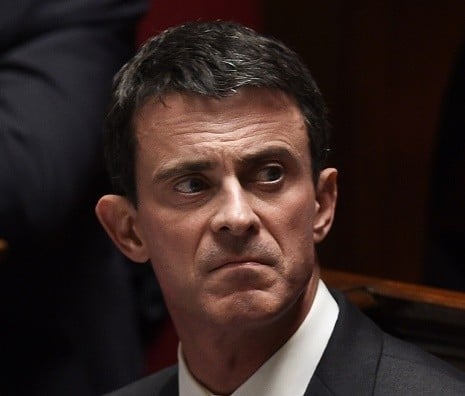What is Manuel Valls' Net Worth?
Manuel Valls is a French politician who has a net worth of $1.5 million.
Manuel Valls emerged as one of the most polarizing political figures in recent French history, serving as Prime Minister of France from 2014 to 2016 under President François Hollande. Born in Barcelona to a Spanish father and Swiss-Italian mother, Valls represents the European integration he would later champion in politics. His career trajectory took him from mayor of the Paris suburb Évry to Interior Minister and eventually to France's second-highest office. Known for his tough stance on security issues and market-friendly economic policies, Valls often clashed with the left wing of his own Socialist Party, gaining a reputation as a pragmatic centrist willing to break with party orthodoxy. His political journey is marked by bold decisions and dramatic pivots, including his controversial defection from the Socialist Party to support Emmanuel Macron, followed by an unsuccessful bid to become Mayor of Barcelona. Valls' career illustrates the complexities of modern European politics and the challenges of navigating ideological transformation in an era of political realignment.
Early Life and Background
Born on August 13, 1962, in Barcelona, Manuel Carlos Valls Galfetti grew up in a multicultural environment. His father, Xavier Valls, was a Catalan painter, while his mother, Luisangela Galfetti, came from a Swiss-Italian family. Valls moved to France as a child and later acquired French citizenship at age 20, maintaining his deep connection to both French and Spanish cultures throughout his career.
Valls studied history at the University of Paris I Panthéon-Sorbonne. His political engagement began early when he joined the Socialist Party's youth wing in 1980, eventually becoming its leader. This early involvement in left-wing politics laid the foundation for his subsequent political career, though his ideological positions would evolve considerably over time.
Rise in French Politics
Valls' political ascent began in local politics. In 2001, he was elected Mayor of Évry, a working-class suburb south of Paris, where he served until 2012. During this period, he built a reputation as a hands-on administrator focused on practical solutions to urban challenges, including crime and economic development.
His national profile grew when he ran in the Socialist Party's 2011 presidential primary, positioning himself as a moderate, "realistic" leftist. Although he received only about 6% of the vote, this campaign increased his visibility and established him as a voice for centrist reform within the Socialist Party.
When François Hollande won the presidency in 2012, Valls was appointed Interior Minister, a position that allowed him to demonstrate his tough approach to security issues. His tenure was marked by a firm stance on immigration and law enforcement, positions that sometimes put him at odds with more traditional leftists but resonated with a public concerned about security.

ALAIN JOCARD/AFP/Getty Images
Prime Ministership
In March 2014, following the Socialist Party's poor performance in municipal elections, President Hollande appointed Valls as Prime Minister, replacing Jean-Marc Ayrault. As Prime Minister, Valls faced numerous challenges, including economic stagnation, rising unemployment, and security threats.
His government pursued business-friendly economic reforms aimed at reducing unemployment and stimulating growth. The most controversial of these was the "Loi Travail" (Labor Law), which made it easier for companies to hire and fire employees. This legislation sparked massive protests and deepened divisions within the Socialist Party between its centrist and left wings.
Valls' prime ministership coincided with a period of heightened terrorist threats in France. Following the January 2015 Charlie Hebdo attacks and the November 2015 Paris attacks, his government implemented strengthened security measures, including a state of emergency that granted expanded powers to law enforcement.
Political Transformation and Controversies
In December 2016, Valls resigned as Prime Minister to run in the Socialist Party's presidential primary for the 2017 election. However, he was defeated by Benoît Hamon, who represented the party's left wing. In a controversial move that many viewed as betrayal, Valls subsequently announced he would support Emmanuel Macron, the centrist independent candidate, rather than his own party's nominee.
After Macron's victory, Valls left the Socialist Party and joined Macron's La République En Marche movement. This political realignment alienated many of his former allies but reflected his increasingly centrist orientation and pragmatic approach to politics.
Barcelona Bid and Later Career
In a surprising move that highlighted his dual national identity, Valls announced in 2018 that he would run for Mayor of Barcelona in the 2019 municipal elections. This unusual cross-border political shift reflected both his Catalan heritage and his diminished prospects in French politics following his break with the Socialist Party.
Despite significant media attention, Valls' Barcelona bid proved unsuccessful, with his candidacy receiving just over 13% of the vote. This defeat represented another setback in a career increasingly defined by political gambles and ideological transitions.
Legacy and Assessment
Manuel Valls' political legacy remains contested. Supporters credit him with bringing pragmatism and realism to a Socialist Party they viewed as excessively ideological, as well as demonstrating firm leadership during a period of security challenges. Critics, particularly on the left, accuse him of betraying socialist principles in favor of neoliberal economic policies and excessive security measures.










 Bengali (BD) ·
Bengali (BD) ·  English (US) ·
English (US) ·